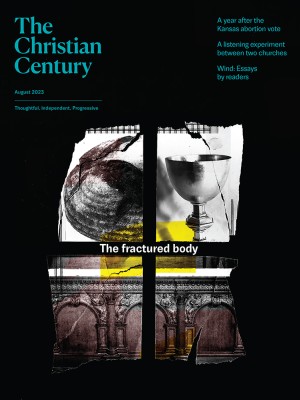August 13, Ordinary 19A (Genesis 37:1–4, 12–28)
Is it possible to be completely and terribly wrong but not all bad?
In my “Sunday’s Coming” email for this week, I thought about what Jacob could have done differently to be a better parent. While being a good parent doesn’t guarantee that siblings won’t feel how they feel or make their own choices, being a parent who manipulates emotions and relationships between children definitely doesn’t lead to anything productive or healing.
But I’m also taken with the latter segment of this text and the path to Joseph’s enslavement. Seeing Joseph come to them from afar (presumably easily recognized in the couture robe he is known for), the brothers plot to kill him. The murderous impulse seems so drastic a response—it just doesn’t seem realistic that it’s coming out of nowhere. Now, I am not advocating for murder in any situation, but this story challenges me differently when I read it through the lens of complex familial ties and complicated human beings figuring out their own trauma and lives. Is it possible for these brothers to be completely and terribly wrong, without being all bad?
Read our latest issue or browse back issues.
It’s a difficult question to ponder in so deeply entrenched a partisan-political church reality, beholden to cycles of misinformation that ratchet up division and bias precisely through the lack of nuance. But what if it isn’t so simple?
Given the broader heroification of Joseph, the arduous tribulations he survived, and some of the most commonly repeated notes of exegesis, it is no surprise how easily we place his brothers in a box of social and mental disorder. But we too live in a world where taking a life can happen easily, even comfortably. Whether the video game–like drone strikes from afar or the mass shootings that seem to happen almost daily, what have we been desensitized to and subsequently complicit in? What do our ideas of the law and what is right—or simply my right—indicate about how we too have been formed to see the world?
In the text, Reuben nobly jumps in and lessens Joseph’s sentence, with a plan to secure his rescue later. As the brother in the minority, he plays mediator amid the tyranny and anger of the majority. But while he is able to hold off the intended fratricide, he still participates in the unjust suffering of his brother. For whatever Joseph’s braggadocious crime, being stripped and thrown into a pit with no water is a trauma immense and undeserved.
“Then they sat down to eat.” How can this be? How can one so viscerally harm one’s own blood and then sit down to a meal as if nothing had ever happened? How can they share fellowship with the echoes of Joseph’s screams still in their ears? To break bread while their brother likely begged them not to leave him there? Is this a mob of entirely dissociated brethren, too desensitized to even flinch with the feeling of remorse?
I’m not particularly inclined to cut these young people much slack because even if their own sense of trauma led to this, trauma cannot justify such gross violence. But I am not willing to dissociate myself from these brothers, either—not when I am sure that we have all brazenly prioritized our own needs or met our own desires in the presence of injustice, in the presence of siblings and kindred suffering, in the presence of our own complicity. Not when suffering and harm scream so loudly in our world it feels safer to turn it off. Not when it feels like we cry out to our loved ones to care but are outnumbered and outpowered.
Oh the irony, for us who are Christians today, to be able to proclaim a God who prepares a table for us in the presence of our enemies—without necessarily being pressed to consider when we are the ones who dare to eat while our siblings starve and thirst.
It is easy to vilify the jealousy and bitterness of the lost band of brothers. But what might we learn when we examine ourselves in the moments along Joseph’s road? What might we reflect on—not as carriers of a dream or as the blessed and highly favored or as the chosen ones, but as humans facing crossroads, as beings who have many a moment when life and death are in our hands?
I’m not sure what in this story compounds the jealousy and feeds the greed and pain that beget such violence and grief. But I think the solution starts with accessing our insecurity before God and being willing to question the scarcity that sells short our vision of the future. And to check if the tables we are sitting at are the very ones Jesus would wish to turn over.





